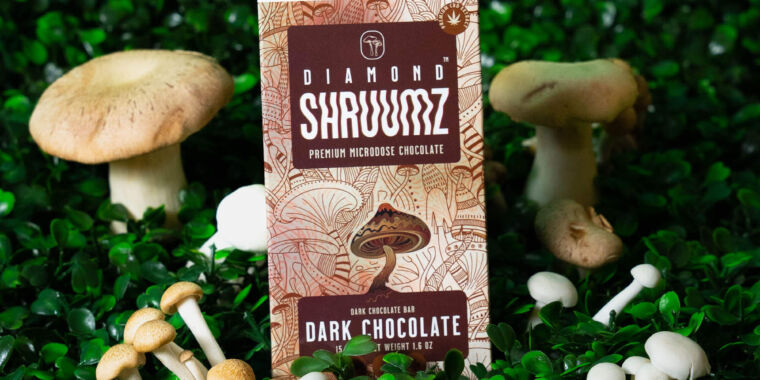The US Food and Drug Administration has identified a synthetic psychedelic compound as well as compounds from a potentially toxic plant in the Diamond Shruumz-brand microdosing candies linked to a growing number of severe illnesses nationwide that have included seizures, intubation, and admissions to intensive care units.
As of June 25, the case total has grown to 39, including 23 hospitalizations, across 20 states, the FDA and the Centers for Disease Control and Prevention reported.
It remains unclear what is in the candies and what may be causing the severe illnesses. Diamond Shruumz does not provide a full list of ingredients. The term “microdosing” and other marketing used by Diamond Shruumz suggests the candies contain a psychedelic compound, but the company does not name any. To figure it out, the FDA has been analyzing multiple samples of Diamond Shruumz-brand candies, including chocolates, gummies, and candy cones. On Tuesday, the FDA reported finding the synthetic psychedelic compound 4-AcO-DMT in the company’s Dark Chocolate Bar and its Birthday Cake Chocolate Bar.
As Ars reported previously, 4-AcO-DMT (aka 4- acetoxy-N,N-dimethyltryptamine, O-acetylpsilocin, or psilacetin) is a common synthetic tryptamine used in psychedelics and was previously suspected to be in the Diamond Shruumz candies. The psychoactive drug has a chemical structure similar to the most notable mushroom-derived psychedelic, psilocybin, as well as LSD. Though safety data on the compound is scant, it is not known to be linked to some of the severe symptoms seen in the current string of illnesses. People who use 4-Aco-DMT describe it as producing effects similar to psilocybin, but without some of the unpleasant side effects noted with natural mushrooms, such as nausea. Still, according to the CDC, some people who use it could experience nausea, vomiting, fast heart rate, anxiety, agitation, lightheadedness, or tremor.
Additionally, the FDA found three compounds from the Kava plant (Piper methysticum) in the company’s dark chocolate bar, though not the birthday-cake flavored bar. The compounds are kavalactones—desmethoxyyangonin, dihydrokavain, and kavain.
Concerning kava
Kava is a plant found on some Pacific Islands and is used in traditional herbal remedies for the treatment of anxiety, insomnia, stress, and other ailments. But, over the years, it has also occasionally been linked to severe liver toxicity. In the early 2000s, this led to warnings, withdrawals, and even bans in several countries, including Germany, Switzerland, France, Canada, and the UK. In 2002, the FDA issued an advisory of its own over the associated liver injuries, which include hepatitis, cirrhosis, and liver failure. Later that same year, researchers published case reports of 11 people (two in the US and nine in Europe) who developed liver failure after using kava products and needed subsequent liver transplants.
In an update on the illnesses linked to Diamond Shruumz candies, the CDC noted that kava can cause numbness of the mouth and skin, loss of coordination, dizziness, sedation, and gastrointestinal effects, such as nausea and vomiting. Consuming kava products alongside alcohol or drugs like benzodiazepines (e.g. Valium and Xanax) can heighten the sedative effects. But, the CDC seemed to downplay the risk of liver toxicity here, noting that it has only occasionally been associated with chronic or heavy ingestion of kava.
In all, it’s still unclear if the compounds the FDA identified in the Diamond Shruumz chocolate bars so far can explain the illnesses seen in the linked cases. The CDC lists the severe and common symptoms from those cases as including seizures, decreased level of consciousness, respiratory failure, nausea, vomiting, abdominal pain, hallucinations, uncontrolled movements, abnormal heart rate (e.g., too fast or too slow), high or low blood pressure, excessive sweating or secretions, and flushed skin.
The FDA said testing of other Diamond Shruumz products is still in progress. The agency noted that there can be differences across products and batches. In the meantime, the agency advises consumers not to eat, sell, or serve any of the company’s products and, instead, discard them.
There is still no recall of the candies. Diamond Shruumz has not responded to multiple inquiries from Ars. The FDA said Tuesday that the agency has “been in contact with the firm about a possible voluntary recall,” but to date, Diamond Shruumz has not initiated one.








:max_bytes(150000):strip_icc()/roundup-writereditor-loved-deals-tout-f5de51f85de145b2b1eb99cdb7b6cb84.jpg)


